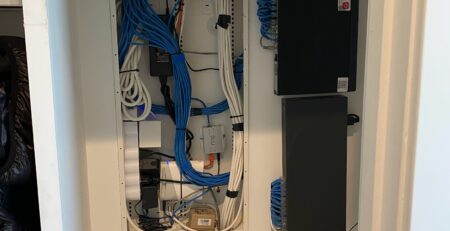Smart Home Security Network Tips
A quick browser search will yield any number of worst-case hacking scenarios. From compromised voice command devices to garage door openers, the list goes on.
Which IoT devices do hackers prefer?
All smart home products are appealing to hackers. Malicious actors hope to gain access to your home network by exploiting an IoT device’s vulnerability. We are living in an age where almost every appliance now has a sensor. Televisions, tablets, and even LED light bulbs have connected apps for download.
Vulnerabilities exist in some networked products. Here are some examples of devices that may be accessible to someone in proximity using a laptop or other Wi-Fi sniffer.
- Smart sprinkler systems
- Smart flood lights
- Remote control garage doors
- Certain automobile systems
The following list shows examples of inside-the-home devices controlled through an app from a smartphone or PC. Some of these devices may use subpar security tokens. Others have vulnerable entry points left open for maintenance.
- Voice Assistants
- Fitness Trackers
- Smart TVs
- Smartphones
- Smart Appliances
- Video Doorbells
- Smart Locks
How can you lock down the devices designed to give a sense of security and comfort?
The risk of smart home network hacking is always present. With so many devices using multiple internet protocols, you should use best practices. An excellent place to start is to follow the tips below.
- Change your router’s default password and name frequently.
- Keep all your devices’ software updated.
- Install new security standards as they are released.
- Invest in a Virtual Private Network (VPN).
- Use two-factor authentication whenever available.
- Avoid using public Wi-Fi networks.
- Always change manufacturer default passcodes.
- Use hard-to-guess passwords on your device accounts.
- Don’t use the same passwords on multiple devices.
- Unplug devices that aren’t in use when traveling.
Our virtual consultations are always free.
If you want to learn more about your home security system or how it connects to your home network, please contact us at 630.844.6300.
About Alarm Detection Systems, Inc.
The expert staff at Alarm Detection Systems can also help create a threat mitigation plan for your alarm system. They can explain the latest technology and which security devices are compatible with your system. ADS has been assisting homeowners for years. Having local insight is one of the key benefits of working with us.
Alarm Detection Systems is one of the largest alarm firms in the country. Family-owned since 1968, we provide business alarms, fire alarms, card access, security cameras, and home security systems. Proudly servicing Chicagoland, Northern Illinois, Northwest Indiana, and Southern Wisconsin in the Midwest. Call us at 630.844.6300 for more information.
In Colorado, we service all of Denver, Boulder County, Northern Colorado, the Eastern Plains, and Colorado Springs. Call us at 1.800.446.7519 for more information.







